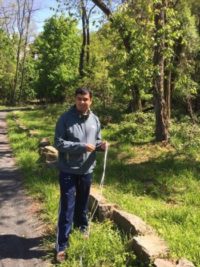On a Saturday morning Neal, my 18-year-old son, was eating his breakfast. It was nearly noon, and since I was the person leading his homeschooling, I felt pressure to kickstart his day with some history. Our kitchen is also a family room, and I was fiddling around with the TV, waiting for him to be done.
For Neal, sleep is elusive. He is still adjusting to his meds for BiPolar/Mood Disorder. I never wake him up in the mornings; I want him to wake up naturally, easily since his sleep is often disrupted.
The pressure inside my head was mounting. There was a lot I wanted to get done. We were trying to catch up on 15 years of schooling. That was because Neal had a breakthrough 1 year and 5 months ago – a blockbuster, life-changing breakthrough.
Neal was diagnosed with autism at the age of 18 months. He had spent his entire life in silence until the age of 17. His teachers tried hard to get him to speak. He could make sounds, repeat words and, with help, name things held up in front of him. Since he was non-verbal, everyone made the assumption that he was also cognitively challenged. So his curriculum mainly consisted of tasks like sorting socks, folding laundry, washing dishes – life skills that he still works on today.
His breakthrough led to the discovery that Neal had learnt to spell and could read, and could keep up with all of us. He had taught himself, locked in his silent world by listening to everyone around him and watching us teach his younger sister. We had stopped teaching him academics since his preschool days – his body was never able to perform tasks a typical preschooler could. Then, 15 months ago, a very special teacher named Sue came into our lives and tried using the revolutionary Rapid Prompting Method. With this, Neal began to spell out words on an alphabet board. He was able, at last, to have his voice heard.
Now, instead of having somebody decide what he ate, when he took a shower, whom he spent time with, Neal could finally decide all those things for himself. We discovered that there was a funny, wry and wise person living within the sweet, gentle, loving son we had always known, albeit non-verbally. For the first three months, I didn’t sleep much, filled with a sense of my own failure. How could I, his mother, not have known this fundamental truth about him? How could I have had him spending all his time repeatedly coloring circles and stacking blocks when all the while, I now realize, he yearned so much to be seen for who he was. He must have felt all those years that there was no chance of discovery, and that perhaps he would die silent and unknown. Despite this, his attitude before and after the breakthrough has always been full of grace. When he does express himself, he talks of how lucky he feels to have a loving family, how happy he is to be able to communicate, and how much he wants to learn. He loves math and history.
After this wonderful discovery, we didn’t quite ride off into the sunset of libraries and college classrooms. As much as he loves to learn, Neal still has autism. His special school is still right for him. His mind can’t control his body and he still needs to learn physical tasks over and over again, until muscle memory can support him. Additionally, he was diagnosed with bipolar disorder a few years ago and various moods frequently roil through him. Often he is laid low in depression, or frozen in place by anxiety, or frantic with manic episodes. The moments when he can actually accomplish the learning he wants to are few. We work to cram as much as we can into the good days. Because that’s what he wants.
On that Saturday morning, I found a history program on PBS for him to listen to while he ate. The title of the program was Secrets of the Third Reich – Hitler’s Madness. I thought this might interest Neal as he is fascinated by World War II. “Was Hitler Bipolar?” began the PBS documentary. Along with it came black and white images, scary music. The film editors had gone to work making BiPolar illness seem bleak and horror filled. I froze, wondering how Neal would respond to this portrayal of his disorder. Then he reached out, put the board in my hand and spelled out. “Mom, you better order that Hitler costume for my Halloween.”




